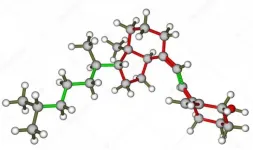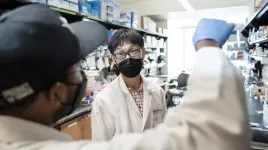(Press-News.org) Paper Title: Safety of Tranexamic Acid in Hip and Knee Arthroplasty in High-risk Patients
Journal: Anesthesiology
Authors: Jashvant Poeran MD, PhD, Director of the Center for Clinical and Outcomes Research, and Associate Professor of Population Health Science & Policy and Orthopedics at the Icahn School of Medicine at Mount Sinai; Calin S. Moucha, MD, Chief of Adult Reconstruction & Joint Replacement Surgery at Mount Sinai Hospital, and Associate Professor of Orthopedics at the Icahn School of Medicine at Mount Sinai; and other coauthors.
Bottom Line: The use of the drug tranexamic acid is commonplace in patients undergoing hip or knee replacement surgery to reduce blood loss. However, this drug works by promoting clotting and safety concerns exist when used in certain high-risk patients such as those with a history of heart attacks, seizures, blood clots, strokes/mini strokes, renal disease, or irregular and rapid heart rates.
Results: Using national data from more than 40,000 patients at 500 hospitals in this retrospective cohort study, Mount Sinai researchers found that approximately half of high-risk patients receive tranexamic acid, similar to non-high-risk patients. Moreover, tranexamic acid use in high-risk patients undergoing hip or knee replacement surgeries is associated with fewer blood transfusions. Most importantly, the researchers found that use of tranexamic acid is not associated with complications such as deep vein blood clots, heart attacks, seizures, or strokes/mini strokes when used in high-risk patients.
Why the Research Is Interesting: The findings address an important knowledge gap on the use of tranexamic acid, a drug that is currently used in the majority of patients undergoing hip and knee replacement surgery. It is unclear how safe this drug is when used in high-risk patients undergoing hip and knee replacement surgery. Mount Sinai's research confirms prior smaller studies that show there is no evidence suggesting the drug carries more complications in high-risk patients.
However, the Mount Sinai team asserts the importance of continued studies to track the safety of tranexamic acid since it has become increasingly used in patients undergoing hip and knee replacement surgeries. Future studies should focus on more detailed parameters on how to reduce the risk of complications in high-risk patients, such as comparing different ways of administering the drug (oral, intravenous, or topical) and dose adjustments.
Who: More than 40,000 patients at 500 U. S. hospitals who underwent hip and knee replacement surgeries.
When: Orthopedic surgeries between 2013 to 2016.
What: The study measured the number of patients who experienced complications following administration of the clotting drug tranexamic acid during hip and knee replacement surgeries.
How: Using the national Premier Healthcare claims database, Mount Sinai researchers analyzed data on patients with preexisting comorbidities who underwent hip and replacement surgeries with use of tranexamic acid. They also considered patient outcomes including a new-onset complication, need for a blood transfusion, and hospital readmission.
Study Conclusions: Tranexamic acid, a decades-old clotting drug that is on the World Health Organization's Essential Medicines list, has been used successfully in various scenarios, including hip and knee replacement surgery, to reduce blood loss and diminish the need for blood transfusions. However, concerns for potential complications persist, especially when the clotting drug is used in high-risk patients. The study did not show an increased risk for complications, and supplements previous smaller studies that confirm the safety of the drug when used in patients undergoing orthopedic surgery.
Said Mount Sinai's Dr. Jashvant Poeran of the research:
This is by no means the final 'say' on this topic, but yet another encouraging sign of the safety of this drug. With an aging population, the demand for such orthopedic surgeries is going to increase and it is, therefore, important to continue study ways to improve patient care and outcomes.
Said Mount Sinai's Dr. Calin S. Moucha of the research:
This is an important clinical conundrum that keeps on coming up as we are aware of the effectiveness of tranexamic acid, but there is not that much data out there on the safety of using tranexamic acid in high-risk patients. Our results will help anesthesiologists and surgeons in their clinical decision-making on something that is unlikely to be answered by a clinical trial.
INFORMATION:
View the full paper END
By Karina Toledo | Agência FAPESP – Can a high dose of vitamin D administered on admission to hospital improve the condition of patients with moderate or severe COVID-19? The answer is no, according to a Brazilian study published in the Journal of the American Medical Association (JAMA).
The article reports a randomized, double-blind, placebo-controlled clinical trial, the kind of study considered the gold standard to evaluate drug efficacy. It was conducted with FAPESP’s support by researchers at the University of São Paulo’s ...
DURHAM, N.H.-- Corals and sponges are important foundations in ocean ecosystems providing structure and habitats that shelter a high number of species like fish, crabs and other creatures, particularly in the seamounts and canyons of the deep sea. Researchers at the University of New Hampshire have discovered that when it comes to climate change not all deep-sea corals and sponges are affected the same and some could be threatened if average ocean temperatures continue to increase in the deep sea of the Northwest Atlantic.
"These deep-sea corals and sponges are ecologically important because they are foundational ...
ITHACA, N.Y. - House finches are locked in a deadly cycle of immunity and new strains of bacterial infection in battling an eye disease that halved their population when it first emerged 25 years ago, according to new research from the Cornell Lab of Ornithology.
House finch eye disease causes red, swollen, watery or crusty eyes. Afflicted birds can recover, but may die because they cannot see well enough to find food or avoid predators. The latest analyses, based on the observations of Project FeederWatch participants from eight Northeast states, addresses the long-term ...
A recently published article in the Molecular Plant-Microbe Interactions journal provides new evidence that pathogens are hijacking the plant immune system to cause disease while providing insights into a newly discovered mechanism.
A large variety of pathogens infect plants and cause different diseases, which can lead to reduced crop yields. During infection, pathogens secrete effector proteins into the plant cell. Some of these proteins target plant proteasomal degradation machinery, which is responsible for recycling proteins to regulate cell processes. Some E1, E2 and E3-ligase proteins have been identified as playing a role in plant susceptibility ...
PHILADELPHIA, PA - The first National Institutes of Health (NIH) National Cancer Institute (NCI)-funded clinical study examining stereotactic body radiotherapy (SBRT) in the treatment of oligometastatic breast, prostate, and non-small cell lung (NSCLC) cancers displayed evidence that SBRT can be safely used to treat patients who have multiple metastases. These results were recently published in JAMA Oncology.
The results of the Phase I NRG-BR001 trial, conducted by the NCI National Clinical Trials Network group NRG Oncology, indicate that SBRT treatment in ...
SAN FRANCISCO, CA--April 22, 2021--In their effort to understand the very earliest stages of life and how they can go wrong, scientists are confronted with ethical issues surrounding the use of human embryos. The use of animal embryos is also subject to restrictions rooted in ethical considerations. To overcome these limitations, scientists have been trying to recreate early embryos using stem cells.
One of the challenges in creating these so-called synthetic embryos is to generate all the cell types normally found in a young embryo before it implants into the wall of the uterus. Some of these cells eventually give rise to the placenta. Others become the amniotic sac in which the fetus grows. Both the placenta and the amniotic sac are crucial for the survival of the fetus, and defects ...
A new research paper examining the relationship between the Omega-3 Index and risk for death from any and all causes has been published in END ...
The extended Baryon Oscillation Spectroscopic Survey (eBOSS) collaboration has released its latest scientific results. These results include two studies on dark energy led by Prof. ZHAO Gongbo and Prof. WANG Yuting, respectively, from National Astronomical Observatories of the Chinese Academy of Sciences(NAOC).
The study led by Prof. Zhao was recently published in Monthly Notices of the Royal Astronomical Society.
Based on eBOSS observations, Prof. ZHAO's team measured the history of cosmic expansion and structure growth in a huge volume of the past universe, corresponding to a distance range between 0.7 and 1.8 billion light years away from us. This volume had never been ...
A joint research study by the Pacific Water Research Centre at Simon Fraser University and the Fraser Basin Council points to the use of certified, nature-based solutions for protecting salmon and aquatic habitats in the Lower Mainland.
Salmon face various threats in the Lower Fraser Watershed (where the Fraser River passes through the Metro Vancouver geographical area), including habitat loss due to urban development and toxic stormwater runoff, which is projected to worsen due to climate change-driven extreme rain events.
The END ...
Like tree rings, cave stalagmites are a portal to a prehistoric Earth, and now scientists from UNSW Sydney have found they are consistently reliable as time trackers the world over.
In a global investigation into the growth properties of stalagmites distributed across the world, the scientists found that while growth fluctuations due to climate events are evident in the shorter period, stalagmite growth over the longer periods - tens of thousands of years - are surprisingly linear.
"Our new global analysis shows that we can consider stalagmite growth as being like a metronome and very ...


